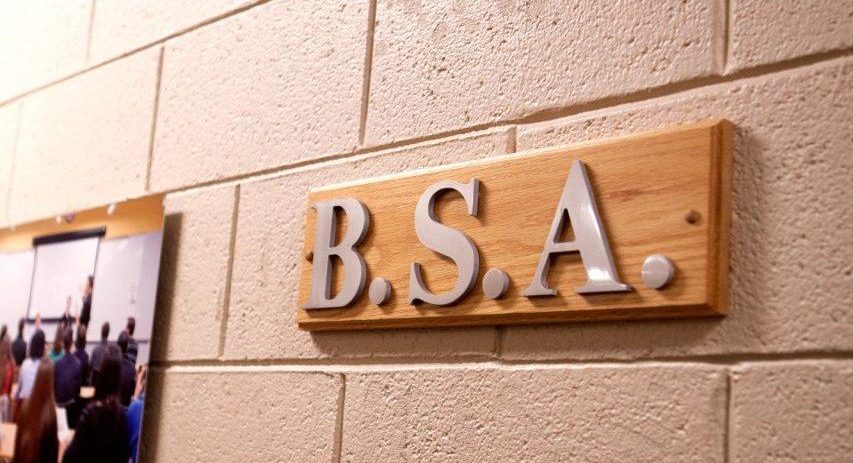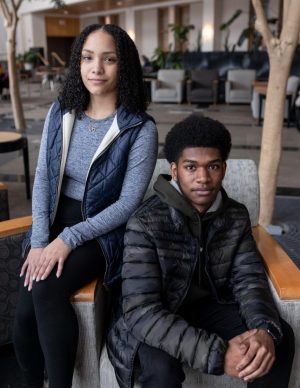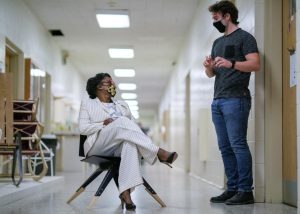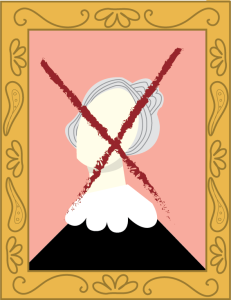A timeline of BSA: From founding to today
The Black Student Association sign outside of its meeting room, March 26, 2018.
February 9, 2022
This is a timeline of the Black Student Association compiled from The Appalachian’s archive, The Rhododendron and App State Library Digital Collections. It chronicles the organization’s progression and many achievements from its founding to today.
Willie Fleming, class of ’80, contributed to the BSA constitution, founded the BSA Gospel Choir and served as director of Minority Affairs and App State chief diversity officer.
“When I was a student, Black students at PWIs across the nation were being enrolled into Predominantly White Institutions in larger numbers, than in previous years. Many were excited about sharing the Black experience. Many of us were insistent about being included, in meaningful ways into the life of our respective universities.
What drove me was my desire to see my culture celebrated, and for Black culture to be woven into the fabric of the life of this university. It was an effort toward racial inclusion. I have always been proud of my culture, but that does not mean that I don’t appreciate the contributions of others,” Fleming wrote to The Appalachian.
Founding of the Appalachian Black Culture Organization, 1970
During 1970, Black students on campus founded the Appalachian Black Culture organization. Upon its founding, all Black students were automatically members. The predecessor to BSA was founded with an almost identical mission to the current organization. The mission statement of ABCO involved university administration and Black culture.
“To present concerns, needs and interests of black students to the administration of Appalachian State University. The organization serves to promote cultural awareness and place special emphasis on the traditions, customs, and history of Black Americans,” according to the App State Library Digital Collections.
Black Cultural Center founding 1970
ABCO created the Black Cultural Center close in time to its founding. The purpose of the center was to promote Black culture through art, magazines, leaflets, films and tape recordings. It was located in the basement of East Hall.
David Alredge, The Appalachian
The Black Cultural Center is vandalized, April 14, 1972
Sometime between April 6 and April 9, 1972, several unknown people vandalized the Black Cultural Center in East Hall. They threw paint on the walls, ceiling and murals decorating the center. Paulis Johnson, a student and ABCO member, said administration had the deadbolts locking the center moved from the inside of the doors to the outside during a renovation prior to the incident. Johnson said the locks were moved “because of statements about black troublemakers.”
Tim Cokley, ABCO president at the time, said he and other ABCO members could feel they were not accepted.
“There is nothing to fear but to understand. We need communicating; talk to us,” Cokley said.
Wayne Fonvielle, The Appalachian
The first Black Expo event May 2, 1972
The week of May 2, 1972, ABCO hosted the first Black Expo. ABCO invited Black students from throughout North Carolina as well as the student body, to experience a Black culture pageant and a series of films such as, “Black Roots” and “Angela as it is.” The week also included workshops about “black music, dance, art, drama, contemporary black politics, drugs and urban affairs.”
Carol Conklin, The Appalachian
Judy Gentry placed on homecoming court by SGA Sept. 26, 1972
During the first meeting of the 1972 SGA student senate, the senate motioned to place Judy Gentry, a Black student, on the 1972 homecoming court because no Black students had been elected to the court. The motion passed with 22 yes votes, 13 no votes and six abstentions. ABCO member Robert Leak spoke in favor of the motion.
“We are organized on campus. We feel we should be represented,” Leak said to the senate.
Wayne Fonvielle, The Appalachian
ABCO asks for clarification following firing of Black professor, Feb. 2, 1973
In January 1973, university administration told Beauregaurd Stubblefield, a Black math professor and one of two Black faculty members, that he would not be rehired for the 1974-75 academic year, without providing a reason. In February, ABCO questioned the administration about Stubblefield’s firing.
“We would like for the administration to make it publicly known why Dr. Stubblefield is not being rehired,” said Tim Cokley, ABCO president.
David Arledge, The Appalachian
Second Black Expo April 5, 1973
During April 1 through April 7, 1973, the second Black Expo took place. Along with guest speakers, gospel concerts, films and dances, the week also included the dedication of the Black Cultural Center.
Marcia Mangum, The Appalachian
ABCO shifts focus to a membership basis December 6, 1973
ABCO president Harry Scott announced the organization was moving to a membership basis, Dec. 6, 1973. Previously, every Black student on campus was considered a member, but now members had to be active participants in the organization.
“The organization does not only plan to work in the interest of blacks, but also to broaden its scope as a club on campus,” Scott said.
Chilton Rogers, The Appalachian
Third Black Expo March 10, 1974
From March 10 to March 17, 1974, ABCO hosted the third Black Expo where the Black Gospel Choir and The Isley Brothers performed, guest speakers spoke and a “womanless wedding” was held.
David Arledge, The Appalachian
Black Cultural Center moves from East Hall to Plemmons Student Union March 12, 1974
The student union board moved the Black Cultural Center from the basement of East Hall to room 122 in Plemmons Student Union. The board also purchased three television sets for the room.
Pam Wilburn, The Appalachian
Robert Leak ABCO wins SGA presidency March 26, 1974
ABCO member, Robert Leak, won the SGA presidency with 1104 votes out of 2174 cast. Leak was the first Black student to be elected to SGA president.
“It’s not a victory for me, but for everybody,” Leak said.
Martha Muse, The Appalachian
ABCO goes inactive and becomes Black Cultural Committee, January 1975
The ABCO went inactive during January 1975. The Black Cultural Committee, which began as a leadership sub-committee of ABCO, took over as the primary Black student organization on campus. By Nov. 20, 1975, BCC had 45 members.
Belle Cool, The Appalachian
BCC hosts Black Awareness Weekend April 8, 1975
The BCC hosted the first Black Awareness Weekend. The weekend was designed for incoming freshmen to experience the university. The BCC also invited students from surrounding high schools and the general public.
Paul Stanley, The Appalachian
BCC hosts Black beauty pageant October 7, 1975
The week of Oct. 9, 1975, the BCC presented a “Celebration of Black Beauty.” The celebration included a beauty pageant where 11 Black women competed to be “Miss Black Culture.” The week also featured performances from a professional dance troupe, an African dress day and performances by a gospel choir.
Belle Cool, The Appalachian
BCC hosts fifth Black Expo, October 26, 1976
The BCC hosted the fifth annual Black Expo the week of Oct. 26, 1976. The theme for the week was “In White America.”
Dru Ellen Pruit, The Appalachian
BCC transitions to Black Student Association, fall semester 1977
Sometime during the fall semester of 1977, BBC changed the name of the organization to the Black Student Association. BSA was advised by the Office of Minority Affairs. The Appalachian first references the BSA by name in an article about Black Heritage Week, which ran Oct. 6, 1977. The fall 1977 edition of the yearbook The Rhododendron also refers to the Black student organization as the BSA.
However, Willie Fleming, a contemporary member, said the name changed during the 1975-76 academic year.
Black Heritage Week October 6, 1977
During the week of Oct. 6, 1977, App State hosted the first Black Heritage Week. The week included lectures from poets and professors, an art exhibit hosted by BSA, a cultural awareness pageant and “culminated” in a cultural awareness ball.
Jocelyn Clayton, The Appalachian
Black Awareness Weekend February 25 and 26, 1978
App State hosted a Black Awareness Weekend Feb. 25- Feb. 26, 1978 to recruit Black students to the university. BSA was invited to the weekend.
Laura Jamison, The Appalachian
Minority student awareness program expands May 2, 1978
The minority student awareness program expanded during spring semester, 1978. Archie Ervin, director of Minority Affairs, said the goal of the program was Black student recruitment. Ervin said BSA choir was a key component to recruiting Black students to App State as well as Black Heritage Week and Black Awareness Weekend.
Laura Jamison, The Appalachian
Black Awareness Week April 5, 1979
The Office of Minority Student Affairs, in coordination with BSA, hosted a Black Awareness Week from April 1- April 7, 1979. The week was intended to recruit Black students and included a bowling tournament, a pool tournament, movies, lecturers and campus tours.
Annette Stoval, The Appalachian
Black Student Association sponsors a play, May 1, 1979
BSA presented the play “Ceremonies in Dark Old Men,” May 2 – May 4, 1979. The play discussed the effects of crime on a Harlem family.
Virginia Meyers, The Appalachian
BSA hosts third culture pageant, October 4, 1979
BSA hosted the third Black Culture Pageant Oct. 7, 1979. The pageant included a beauty pageant, fashion displays and talent shows.
Virginia Meyers, The Appalachian
Black Heritage Week October 4, 1980
The Office of Minority Student Affairs and BSA jointly hosted Black Heritage Week. Terry Connelly, BSA president at the time said the purpose of the week was “to inform people of the black heritage, where the blacks are now and where they’re going.”
Phyllis Buchanan, The Appalachian
Black Heritage Week February 1, 1981
The Office of Minority Student Affairs and BSA hosted Black Heritage Week in congruence with Black History Month Feb. 1 – Feb. 7, 1981.
Cindi Wells, The Appalachian
First BSA awards banquet April 22, 1982
BSA hosted their first awards banquet April 22, 1982.
“The purpose of the banquet was to recognize those black students and faculty members who made a contribution to the Black Student Association (BSA) and to the campus as a whole,” Leaper wrote.
Vaneta Leaper, The Appalachian
Willie Fleming becomes director of minority student affairs, Sept. 20, 1983
Willie Fleming took over from Archie Ervin as director of Minority Student Affairs at the beginning of the 1983 fall semester.
Fleming graduated from App State in spring 1980. During his time as an undergraduate, he founded the BSA Gospel Choir and helped draft the BSA constitution.
Robert McCallister, The Appalachian
BSA reaches 75 members, May 1, 1984
BSA reached a total of 75 members out of 361 Black students enrolled at App State by the spring semester, 1984. Comparatively, The Appalachian reporter Chilton Rogers wrote there were 112 Black students at App State in 1974.
Patricia Johnson, The Appalachian
Black Heritage Week 1985
BSA hosted Black Heritage Week from Oct. 1 – Oct. 7, 1985. It was the first Black Heritage Week to include a Kwanzaa celebration.
Debora Crisp, The Appalachian
BSA celebrates Dr. Martin Luther King Jr. January, 1986
BSA hosted a celebration of Martin Luther King Jr.’s life and work Jan. 15 – Jan. 17, 1986. The three-day celebration coincided with King’s birthday and included BSA Gospel Choir performances, scripture readings and prayers from Willie Fleming, director of Minority Affairs. Fullington wrote that 1986 was the first year King’s birthday was recognized as a holiday.
Angie Fullington, The Appalachian
BSA Gospel Choir performs in the Bahamas, 1987
St. Michael’s Methodist Church in Nassau, Bahamas, invited the BSA Gospel Choir to perform during spring break 1987. The BSA Gospel Choir financed the trip themselves through a series of fundraisers.
Mary Miller, The Appalachian
BSA reaches over 100 members, 1988
BSA reached 140 active members by March 17, 1988.
April Griffin, The Appalachian
Black student population rises, 1989
There were 492 Black students at App State in 1989. App State ranked 14th among North Carolina universities in Black student enrollment. Assistant director of admissions Harry Williams credited BSA, the BSA Gospel Choir and Black fraternities and sororities for Black student retention rates.
Julie Williams and Mark Williams, The Appalachian
Black Heritage Week, 1990
BSA hosted Black Heritage Week, Oct. 15 – Oct. 21 1990. The week included a banquet honoring Black App State football players.
Elizabeth Craven, The Appalachian
Black student population rises, Nov. 14 1991
App State had “nearly 600” Black students during the 1991 fall semester.
“ASU is very unique because there is a level of concern for minority groups on campus,” said Harry Williams, director of admission. “If there was not there wouldn’t be organizations such as the Black Gospel Choir or the Black Student Association.”
Tracy Williams, The Appalachian
The Appalachian profiles Black student leaders, 1992
For the first time since Robert Leak was elected SGA president in 1974, The Appalachian profiled Black student leaders. The Appalachian reporter Marla Massey wrote profiles on SGA Vice-President Reggie Murphy and SGA student affairs committee chairperson, Doug Duncan Feb. 25, 1992.
The Appalachian profiles BSA president, Feb. 16, 1993
The Appalachian reporter Kristine Forrest wrote a profile on Tasha White, BSA president.
“I would like to encourage everyone of color to come to BSA meetings to see for themselves how BSA runs,” White said.
Additionally, BSA had “between 35-45” members in the spring of 1993, Forrest wrote.
BSA advisory board established, Oct. 26, 1994
BSA and Barbara Stewart, director of African American Student Development, established the BSA advisory board in the fall of 1994. The goal of the advisory board was to “reassess the purpose of BSA and promote interest in the organization.”
“There was a lack of interest from students to participate in BSA, so this seemed to be an appropriate time to start something new,” Stewart said.
Stacy Ihler, The Appalachian
BSA moves to advisory board for leadership, April, 1995
BSA transitioned from an executive board leadership to an advisory board leadership in April 1995. The change came with tighter membership requirements and clearer identification of members. The advisory board was made up of 10 members representing different committees, each with a faculty advisor.
Allison Pennel, The Appalachian
BSA hosts MLK Birthday celebration 1996
BSA hosted a celebration of Martin Luther King Jr.’s birthday in Rosen Concert Hall Jan. 15, 1996. The celebration included a performance from the BSA Gospel Choir.
“African-Americans and whites alike gathered to live out Dr. King’s dream,” Perrin wrote.
Perrin Avent, The Appalachian
BSA sponsors cultural fair, February, 1997
According to the Feb. 20, 1997 edition of The Appalachian, the BSA advisory sponsored a cultural fair in conjunction with the multicultural center, Feb. 24, 1997.
BSA credited with Black student recruitment, 1999
According to the 1999 Graduate Bulletin, the BSA and BSA Gospel Choir are credited with “collaborating extensively” in the recruitment of Black students to App State.
Black History Month, 2000
The newly renamed Multicultural Center hosted Black History Month events throughout February 2000. The events included an oratorical competition presented by Willie Fleming, which included BSA member contestants.
Tiffany Fant, The Appalachian
Kwanzaa 2001
The Multicultural Center hosted a Kwanzaa celebration Dec. 4, 2001. The Multicultural Center organized the event in conjunction with the BSA.
Chris Bohle, The Appalachian
App State minority enrollment, 2002
According to the February 2002 edition of The Appalachian, App State enrolled 221 minority students for the fall semester 2002, a 98 student increase from the previous year. University representative Dontrell Parson credited BSA among other multicultural organizations with the rise in minority student enrollment.
BSA ski weekend Feb. 7, 2003
BSA hosted a ski weekend Feb. 7, 2003, called Project Ice. The goal of the weekend was to encourage students of color to explore the ski slopes, Sellers wrote.
Jessica Sellers, The Appalachian
BSA membership 2004
According to the 2004 edition of The Rhododendron, BSA had 20 members and four advisory board officers in 2004.
BSA hosts fashion show, April 15, 2005
BSA hosted a fashion show in the Summit Trail Solarium. The fashion show was a fundraiser for the BSA diversity scholarship.
Clair Baxter, The Appalachian
BSA hosts AIDS awareness week, 2006
According to the 2006 edition of The Rhododendron, BSA hosted an AIDS Awareness Week in 2006.
“We felt the need to make the campus more aware of what’s going on in the world by giving information and statistics,” said Charmeen Mack, BSA advisory board member.
BSA discusses Black History Month in The Appalachian, Feb. 22, 2007
BSA members T. Shanel Boston, Jammal Forney, Rebecca Carew and Aleea McCulloughed discussed “issues facing black culture” in a Feb. 22, 2007 article in The Appalachian, written by Lindsay Craven. Topics included portrayal of Black men and women in society, changes in political correctness and making improvement at App State for Black students.
Black History Month task force established, February, 2008
App State established the Black History Month task force February, 2008. The goal of the task force was created to better organize events for Black History Month. During the month, the BSA hosted a presentation of “Africa Before Colonization” and the BSA advisory board worked closely with the task force to schedule events.
Jamison Doran, The Appalachian
The Appalachian profiles BSA president, February 2009
The Appalachian reporter Stephanie Straubel wrote a profile of BSA president Houston Sloan, Feb. 5, 2009.
“I think some people on campus are not used to diversity. Many people regard diversity as color but it is so much more than that,” Sloan said.
BSA sponsors blood and bone marrow drive, Feb. 24, 2010
BSA hosted its eighth annual blood and bone marrow drive Feb. 25, 2010 in partnership with the American Red Cross.
Will Johnson, The Appalachian
BSA has 60 active members, Feb. 1, 2011
By Feb. 1, 2011, BSA had 60 active members.
Bridget Theresa Ryan, The Appalachian
Black History Month 2013
Black History Month included multiple events hosted by BSA such as Black Love Week and lectures from Black professors.
“It’s a year-long thing. I can’t turn off being black and I can’t change who I am,” said BSA president Lauren Hamilton.
Stephanie Sancoucy, The Appalachian
BSA goes to social media March 6, 2014
On March 6, 2014, BSA posted on Instagram for the first time. The post referred to an event called “Black Girls Rock,” which had been hosted by the BSA from March 3 – March 6, 2012.
BSA wins collaboration award, 2015
According to the BSA Instagram, in April 2015, the Center for Student Involvement and Leadership presented BSA with the Collaboration Award. The award recognizes organizations with “outstanding collaboration efforts to enhance student life at Appalachian State University.”
Black Town Hall, 2016
According to the BSA Instagram, BSA hosted a Black Town Hall April 18, 2016. The purpose of the town hall was to discuss making changes on campus.
Black Excellence Awards, 2017
BSA hosted a celebration for their Black Excellence Awards Feb. 28, 2017, according to the BSA Instagram.
First meeting, 2018
The BSA hosted their first meeting of the year Sept. 10, 2018 in Macrae Peak room in the Plemmons Student Union, according to the BSA Instagram.
Black History Month, 2019
The BSA hosted Black History Month events throughout February 2019. The events included a Super Bowl party, a Black family mixer, speakers and ended with the Black Excellence Awards, according to the BSA Instagram.
Virtual Town Hall, 2020
BSA hosted a virtual presentation on police interactions Sept. 14, 2020. The presentation was titled “Getting Questioned by Police. Know Your Rights Series,” according to its Instagram.
Self Love Series, 2021
The BSA hosted poet and founder of GreenLit ATL, Ernestine Johnson-Morrison, for the final presentation in a BSA presentation series titled “Self Love,” according to the BSA Instagram.
The BSA 2022
Lamont Sellers, director of Intercultural Student Affairs, said BSA has around 130 active members.
The Future of the BSA
Lamont Sellers, director of intercultural student affairs, said the thing that defines the BSA is unity.
“They’re very much about creating community and being together while they’re here but then even those that graduate are reaching back and wanting to help out however they can. Because they know intimately how difficult it was,” Sellers said.
Sellers said the current BSA is in good hands.
“One thing that I find among many of our African-American, Black identifying students is, they want to see others come here and thrive and be successful,” Sellers said.














TIMOTHY COKLEY • May 29, 2024 at 11:34 am
Thanks. I enjoyed reading your BSA Timeline interesting to see how information from 1968 to 1973 was shared. From where did you gather your source of information?